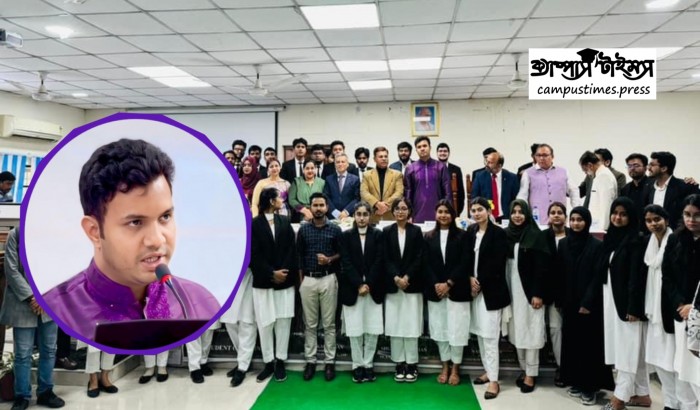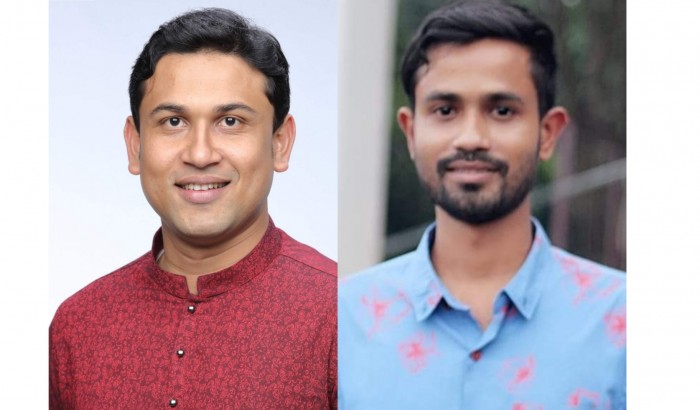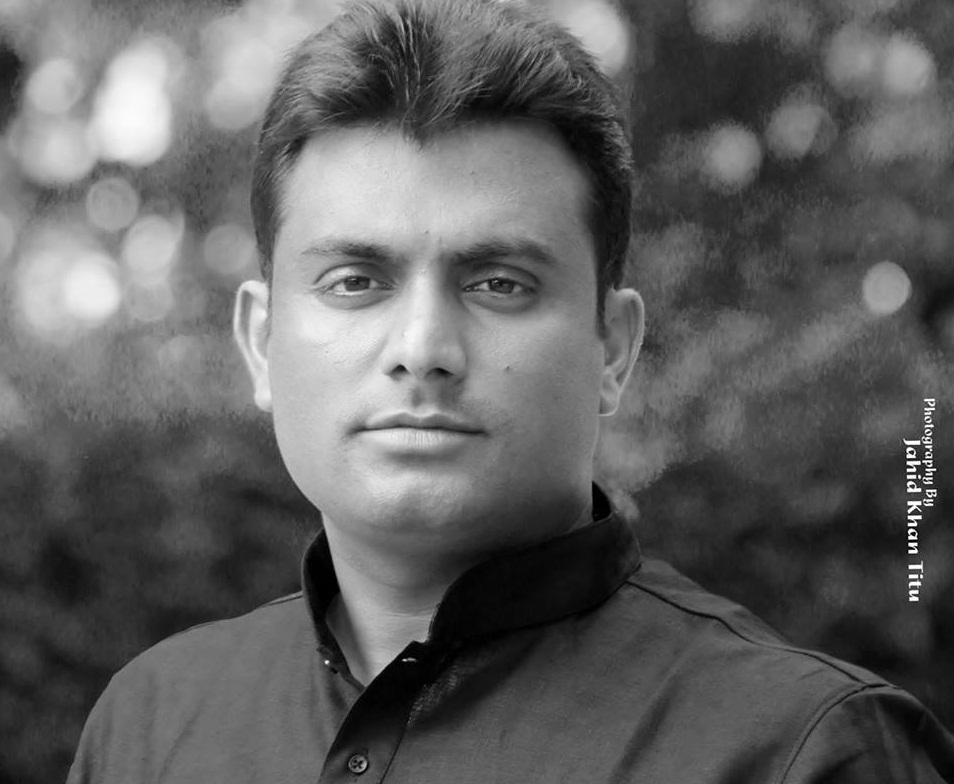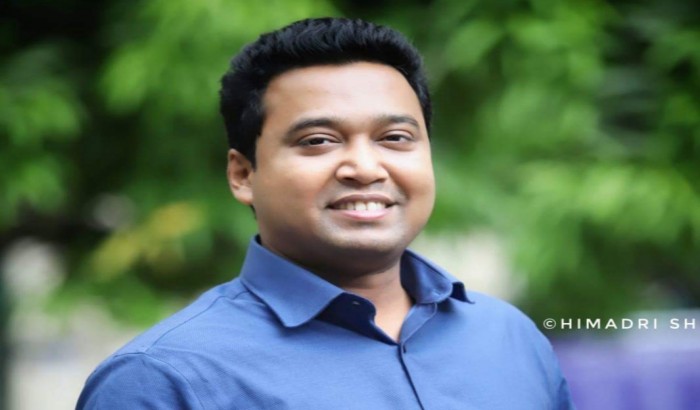
Voice of the World: Honoring Mother Languages and Fostering Cultural Exchanges
Keynote Speech by Saddam Hussain, President, Bangladesh Students League
Respected Chair,
Esteemed guests,
Dear friends in Aligarh,
Ladies and gentlemen
Assalamu Alikum and a Very Good Afternoon.
Aligarh Muslim University has been a beacon of academic excellence and cultural heritage in South Asia. Sir Syed Ahmad Khan’s noble initiative in 1875 today stands as a testament to the enduring spirit of enlightenment and progress. Its rich history and tradition of academic excellence have earned it the well-deserved reputation as one of India's premier institutions of higher education.
I extend my warm greetings to each and every one of you gathered here today in the hallowed walls of Dr. B. R. Ambedkar Hall at the Aligarh Muslim University. This place stands as a tribute to India's constitution architect, whose vision and intellectual labor has upheld the unity of diverse ethnicities in India, even in this polarized world. It is indeed a great honor for me to stand before you in this historic institution, where knowledge, wisdom, political consciousness, and commitment towards nation building have flourished for generations.
Today we come together as allies in the noble cause of honoring our mother languages and fostering cultural exchanges on the occasion of International Mother Language Day 2024. I am Saddam Hussain, currently serving as the President of the Bangladesh Students League, one of the largest student bodies in the world. The Birth of Bangladesh Students League, the then East Pakistan Student League is intricately related to this question of honoring mother language. When senior politicians of the then Muslim League showed indifference to the question of Bangla being a state language of Pakistan, father of the nation of Bangladesh, Bangabandhu Sheikh Mujibur Rahman spearheaded the foundation of the then East Pakistan Students League, now known as Bangladesh Students League. Looking back through an objective lens, it can be said that the mother language movement laid the foundation of an independent Bangladesh, and Bangladesh Students League take pride in being at the forefront of this journey.
International Mother Language Day, observed annually on 21 February, serves as a global platform to raise awareness about the significance of linguistic and cultural diversity while advocating for multilingualism. Initially proposed by UNESCO on 17 November 1999, the day gained formal recognition from the United Nations General Assembly through the adoption of UN resolution 56/262 in 2002. UN General Assembly Resolution No 61/266 adopted on 16 May 2007 further said that international mother language day is an initiative to promote the preservation and protection of all languages used by peoples of the world.
21 February, the International Mother Language Day bears the scars of a tumultuous past, marked by the bloodshed of brave Bengalis who valiantly fought for the recognition of their mother tongue, Bangla. The students and activists took to the streets to protest against the imposition of Urdu as the sole official language of the then Pakistan in 1952. Police gunfire targeted demonstrators on 21 February 1952, resulting in the fatalities of Abdus Salam, Abul Barkat, Rafiq Uddin Ahmed, Abdul Jabbar, and Shafiur Rahman, alongside injuries sustained by numerous others. This event stands as a unique historical occurrence, marked by individuals laying down their lives in defense of their native language. This historic day serves as a solemn reminder of the sacrifices made to uphold the right to mother language, inspiring generations to cherish and defend their linguistic heritage.
Following the creation of Pakistan on the premise of the two-nation theory, the first blow struck at the heart of Bengali identity was the assault on our mother language. The newly formed state of Pakistan grappled with the challenge of accommodating its diverse linguistic communities. The decision to declare Urdu as the sole official language of Pakistan, disregarding the linguistic rights of Bengali speakers in East Pakistan, ignited a fierce resistance from the very beginning of the birth of Pakistan. This imposition sparked outrage among the Bengali-speaking populace, who saw it as an affront to their identity and heritage.
At this point, I want to remember Dhirendranath Dutta, a lawmaker, with great respect and admiration for his fearless advocacy on behalf of the Bengali-speaking people of East Pakistan in the constituent assembly of Pakistan. His courageous stand in the Constituent Assembly of Pakistan on February 25, 1948, where he boldly advocated for the recognition of Bangla as the national language, remains a testament to his unwavering commitment to linguistic equality, upholding mother language and human rights. He said:
“The state language of the state should be the language, which is used by the majority of the people of the state, and that, Sir, I consider that Bengali language is the lingua franca of our state.”
At the forefront of this pivotal moment stood Sheikh MujiburRahman, a then law student at the University of Dhaka. He declared, "No nation can tolerate the humiliation of mother tongue." In 1948, he spearheaded the formation of the Rashtrabhasha Sangram Parishad, advocating for Bangla to be recognized as one of Pakistan's state languages. The lately published “Secret Documents of Intelligence Branch on Father of the Nation, Bangladesh: Bangabandhu Sheikh MujiburRahman" provide insights into his activities.
It was a time of great upheaval and unrest, as students and intellectuals alike took to the streets to protest the unjust imposition of Urdu as the sole official language of Pakistan. The movement culminated in a strike on March 11, resulting in Bangabandhu's arrest and subsequent imprisonment, during which he continued to lead through various means, even fastingfor 11 days for in Faridpur jail. His unwavering dedication to the cause, as chronicled in his two biographies 'Unfinished Memoirs' and 'Prison Diary,' exemplifies the sacrifices he made to uphold the dignity of our mother tongue.
Bangabandhu Sheikh Mujibur Rahman has later on kept defending any attack against Bengali cultural practices and the language throughout his life. When the Pakistani regime banned playing Tagore’s songs in national radio, he valiantly protested against such activities; he later made one of Tagore’s songs the national anthem of Bangladesh. He ensured that the constitution that citizens of Bangladesh will give to themselves is written in his mother language, and said in the constitution that in case of any conflict as to meaning and language, Bangla shall prevail. This linguistic nationalism, love for own people, commitment to the cause of mother language and its autochthonous culture and tradition made Sheikh Mujib one of the iconic figures among politicians of all time.
As we reflect on the courageous endeavors of leaders like Bangabandhu Sheikh Mujibur Rahman, Dhirendranath Duttaand others in championing the cause of linguistic equality and cultural preservation, we must also acknowledge the pivotal role played by Prime Minister Sheikh Hasina in solidifying the legacy of the International Mother Language Day. Building upon the sacrifices made during the language movement of 1952, Prime Minister Hasina's swift and decisive action in that regard underscores her unwavering dedication to upholding the dignity of mother languages worldwide.
By collaborating with expatriate Bangladeshis and mobilizing diplomatic efforts, she ensured that the voices of those who fought for linguistic rights were heard on the global stage. Two Bangladeshi expatriates residing in Canada, Mr. Rafiqul Islam and Mr. Abdus Salam, initiated efforts to designate February 21st as 'International Mother Language Day.' However, United Nations protocol mandated submissions from member states rather than private individuals. As their proposal faced a hurdle, Prime Minister Sheikh Hasina promptly took action within the tight timeframe of 24 hours.
Collaborating with the 'Committee for the Preservation of the Mother Language,' led by expatriates, the Awami League Government submitted the proposal to UNESCO via fax on September 9, 1999. Urgently, diplomatic missions were tasked with rallying support from other member states. Consequently, on November 17, 1999, the UNESCO General Conference adopted the proposal, formally recognizing February 21st as International Mother Language Day, observed annually since 2000. Furthermore, Prime Minister Hasina's commitment to establishing an institute dedicated to language research and preservation underscores her enduring resolve to safeguard endangered languages and promote cultural heritage for generations to come. The official recognition of 21 February as International Mother Language Day serves as a poignant reminder of the sacrifices made by countless individuals in the pursuit of linguistic diversity and cultural preservation. This is how through visionary leadership, Prime Minister Hasina has cemented Bangladesh's place in the global arena as a champion of linguistic equality and cultural diversity.
Recognition of mother language movement in the international stage is not a goal end in itself. Rather we have to make sure that such recognition is able to break shackles of discourses which dishonor mother languages of people from different ethnicity. Every year on the day of 21st February, the Bangladesh Students League wears black badges in recognition of the martyred individuals who gave away their lives for the cause of their mother language. We also pay tribute to the national monument “Shaheed Minar”, established to commemorate those killed during the Bengali Language Movement demonstrations of 1952 in the then East Pakistan. Bangladesh Students League also organizes a Provat Feri, a morning procession of students singing songs commemorating the memories of the martyred souls. From Bangladesh Students League we promote cultural activities to uphold our unique linguistic cultural practices, we promote cultural exchanges, we want to foster cultural diversity.
We envision a world where language and cultural barriers dissolve, where individuals from diverse backgrounds share their stories, traditions, and aspirations. In this imagined world, unity flourishes not through conformity, but through the vibrant tapestry of our differences. Fostering cultural exchange stands as a formidable force in nurturing and safeguarding cultural diversity on a global scale. Through meaningful interactions, shared experiences, and a mutual appreciation of diverse traditions, cultures, and languages, individuals and communities forge deeper understanding and respect for one another's unique identities. I believe cultural exchange initiatives can play a pivotal role in celebrating heritage, customs, and values, thereby fostering a sense of inclusivity and unity amidst diversity. By embracing cultural exchange, societies can dismantle barriers, state can bridge divides, and human civilization can cultivate a more interconnected world where the richness of each culture is esteemed and cherished. This exchange not only enriches individual lives but also fortifies the societal fabric by promoting tolerance, empathy, and mutual understanding across geographical borders and cultural boundaries.
In today's interconnected world, cultural exchange can serve as a conduit for promoting global citizenship and fostering cross-cultural dialogue. By engaging in such exchange exercises, individuals have the opportunity to broaden their horizons, challenge stereotypes, and develop a more nuanced understanding of the world around them. These interactions enable participants to transcend cultural stereotypes and biases, fostering empathy and appreciation for the diverse perspectives that enrich our global community.
As we commemorate International Mother Language Day, let us recommit ourselves to the ideals of linguistic diversity and cultural exchange. Let us embrace the opportunity to learn from one another, celebrate our differences, and cultivate a more inclusive and harmonious world. By fostering cultural exchange, we can create a future where diversity is not merely tolerated but embraced as a source of strength and resilience. Let us urge the states to invest more on promoting and protecting mother languages, its culture and traditions towards a more resilient and harmonious world.
Honoring International Mother Language Day is more than a tribute to past struggles; it's about ensuring the harmonious resonance of our languages in the global symphony of human civilization. Let us carry forward the torch of linguistic equality and cultural exchange ignited by the Language Movement and embodied by the exemplary leadership of Bangabandhu Sheikh Mujibur Rahman. Embracing the richness of our mother languages and fostering dialogue among nations honors the sacrifices of our predecessors and strengthens our shared humanity.
As we mark International Mother Language Day, together, let's march courageously towards a brighter, more inclusive future, knowing that our efforts today shape tomorrow. Reflecting on the Language Movement's legacy, let's embrace tolerance, inclusivity, and cultural dialogue. Recognition of the Language Movement by UNESCO and the United Nations is not just a historical nod; it is a call to preserve languages and uphold cultural diversity worldwide.
Let's ensure that our languages resonate harmoniously. Thank you for joining us on this historic journey. By celebrating our mother languages and promoting cultural exchanges, we honor humanity's spirit and amplify all voices today.
Thank you so very much.
ভারতের আলিগড় মুসলিম বিশ্ববিদ্যালয়ের এক অনুষ্ঠানের ‘চিফ কি নোট’ স্পিকার হিসেবে বক্তব্য প্রদান করেছেন ছাত্রলীগের সভাপতি সাদ্দাম হোসেন।
বৃহস্পতিবার বেলা ১১টায় বিশ্ববিদ্যালয়টির আয়োজনে ‘ভয়েসেস অব দ্য ওয়ার্ল্ড : অ্যা সেলিব্রেশন অব ইন্টারন্যাশনাল মাদার ল্যাঙ্গুয়েজ ডে’ অনুষ্ঠিত হয়। ছাত্রলীগের দপ্তর সম্পাদক মেফতাহুল ইসলাম পান্থ স্বাক্ষরিত এক বিজ্ঞপ্তিতে এ তথ্য জানানো হয়।





